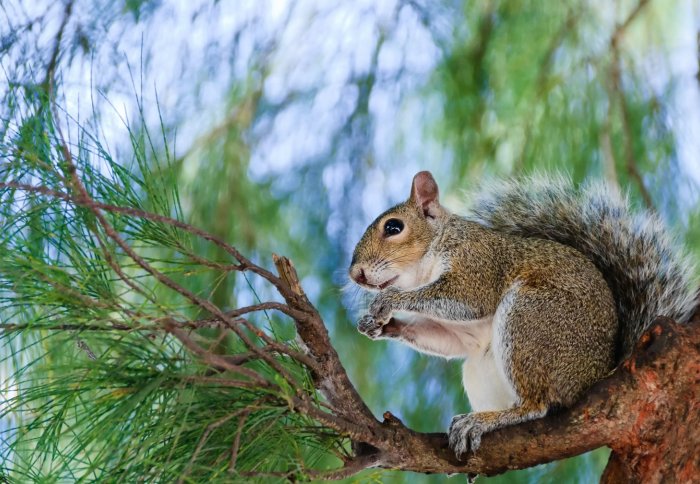JoeyVimsanteThePoet
Member





Is there no natural predator in Cornwall to keep them in check?Here in Cornwall, you will fall over the bloody tree rats, no matter what park, public garden, NT property, et al that you visit. Unfortunately the holiday makers think they are cute and hand feed them.
They have driven out our native Red as they out compete them and carry, but are immune to, the Squirrelpox virus, which is lethal to Reds.
I know it is politically incorrect to say this, but I would happily cheer on anyone who attempted to exterminate them. They are nothing more than vermin.


No, it basically isn't. Badgers, Foxes, Polecats, Stoats and Weasels are all persecuted but thankfully still here though the smaller mustelids are in decline: it would be much preferable even if in forestry areas control measures existed, to have Red Squirrels and not the introduced Greys (incidentally having watched their decimation and wasting of most of the hazel crop across my local area I wonder if they are also a considerable factor in Dormouse decline.)Grey squirrels and Red squirrels basically occupy the same ecological niche. Before the introduction of Greys into the UK Reds were mercilessly persecuted, so much so that they had to be reintroduced into the UK from continental Europe. The current narrative of "investations of nasty, introduced Greys" vs "loveable cute native Squirrel Nutkin" is basically nonsense.

Yes. They were persecuted but I have never heard of this claim of their needing to be reintroduced. Please supply references.Before the introduction of Greys into the UK Reds were mercilessly persecuted, so much so that they had to be reintroduced into the UK from continental Europe.
I don't agree that the fact that past persecution of native red populations in Britain to such a level that some land owners reintroduced reinforcements from European stock to rebuild the population locally negates current and future attempts to support what is officially a native species against one officially classed as vermin, which is illegal to release.Grey squirrels and Red squirrels basically occupy the same ecological niche. Before the introduction of Greys into the UK Reds were mercilessly persecuted, so much so that they had to be reintroduced into the UK from continental Europe. The current narrative of "investations of nasty, introduced Greys" vs "loveable cute native Squirrel Nutkin" is basically nonsense.




Probably, certainly bolder as they become used to humans offering titbits. I live in a rural area and they are far easily spooked at first sign of people and flee.Are Grey squirrels normally more tame in Towns?

The vast majority of Red Squirrels in the UK are of continental lineage, the British subspecies is very rare indeed. This paper is old but outlines their decline and reintroduction.They were persecuted but I have never heard of this claim of their needing to be reintroduced. Please supply references.

FFS just a new member posting a picture and asking a harmless question.
Yes we all know how great those that believe in culling are. Try keeping your brilliance to yourselves unless asked then I won't stumble over a load of old blox by accident, again - I don't care.
Grey squirrels and Red squirrels basically occupy the same ecological niche. Before the introduction of Greys into the UK Reds were mercilessly persecuted, so much so that they had to be reintroduced into the UK from continental Europe. The current narrative of "investations of nasty, introduced Greys" vs "loveable cute native Squirrel Nutkin" is basically nonsense.

The major "issue" I find, is popular perception of squirrels. As I mentioned in message #4In answer to the original question (I got there in the end). I'm not sure tame, so much as emboldened, is the right word for greys in cities. One once ran up the leg and arm of a friend while he was enjoying the spring sunshine and eating lunch - the squirrel made off with a decent portion of egg mayonnaise... I guess it made a change from nuts.
Red Squirrels ARE cute. The Red was seen by the general population as CUTE. Any childrens story books, etc.Unfortunately the holiday makers think they are cute and hand feed them.
Walt Disney, and more recently, almost any modern wildlife documentary, have a lot to answer for. Anthropomorphism is rife, and it's not a healthy trend, treating wild animals as if they were little people, or pets once-removed.The major "issue" I find, is popular perception of squirrels. As I mentioned in message #4
Red Squirrels ARE cute. The Red was seen by the general population as CUTE. Any childrens story books, etc.
As the red has disappeared and replaced by grays, the poulation haven't generally noticed and CUTE just transfered to the grays. The Red had morphed into the gray in the general perception of nature.
I live near Tehidy Country Park, Cornwall where there are lots of grays, who just run up to you and accept nuts, etc, fearlessly. I just ignore them.
I will sometimes stop and enjoy watching the faces of the youngsters, full of awe and wonder, while they fed them. Talking to the adults showed me that very few had ANY knowledge about them. They were just CUTE and amazing!!! FULL STOP.


I tend to support the theory that the ability to out compete is/was a prime factor, but.in all honesty, does it really matter, in the current situation, which caused the decline?If I remember correctly - and it was a long while ago - the conclusion of an essay I wrote as part of my ecology degree, which involved reading pretty well all the papers on the topic, was that competition from grey squirrels was the main cause and the spread of disease between the species very much a secondary issue but, of course, views may have changed since then.
